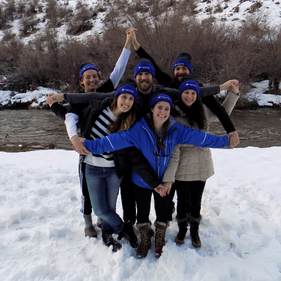Hillels Give New Energy, Bring More Students to Shabbat

Hillels are on a mission: to reenergize Shabbat.
Stretching from coast to coast, Hillels are reimagining Shabbat experiences to empower students to connect with Judaism and become Jewish leaders. Their creative efforts offer an alternative to traditional Shabbat services, which involve structured prayer in a synagogue.
Dalilah Bernier, a Hillel International Springboard Ezra Fellow at Hillel Milwaukee, said these innovative services deepen Jewish connectivity, as they offer new opportunities for students to learn more about each other and Jewish values.
Shabbat is central to Judaism and Jewish life, she added. The consistency and variety of these weekly gatherings help students connect with each other.
“The motivation for students to create their own services stems from their desire to break from the ordinary prayer experiences they’re used to,” Bernier said.
Oregon Hillel, where celebrating Shabbat outdoors is the norm, is one of those Hillels that is creating new and extraordinary Shabbat experiences.
The popular winter program, called Retreat in the Snow, brings about 80 students to Bend, Oregon for a weekend of skiing and Jewish learning. When the weather gets warmer, a smaller group of students head to the Pacific Coast for a weekend retreat, which includes a Shabbat service overlooking the ocean.
Hillel for Utah also organizes Shabbat experiences in the great outdoors.
The Snow and Desert Shabbaton, focusing on the connection between Judaism and Israel, is a favorite. Students have used microscopes to compare particles in the Great Salt Lake with Israeli water sources, including the Dead Sea and the Mediterranean Sea.
Other Shabbat experiences at Hillel for Utah have included goat yoga and weekend hikes in the mountains.
Chloé Laverson, an alumna of Hillel for Utah, said some of her favorite college memories were celebrating Shabbat at Hillel. Laverson, 22, served as president of Hillel for Utah prior to graduating last May.
“Hillel for Utah Shabbatot are so inclusive and welcoming,” said Laverson, who holds a degree in strategic communications from University of Utah. “I always knew I had Shabbat night plans.”
Towson University Hillel is also revamping Shabbat, empowering students to make services their own.
Leora Match, the program director at Towson Hillel, said students have updated the Hillel siddur, or prayer book, to make the language more accessible.
“The assortment of prayer books we had were either hard to follow, had archaic English translations or lacked good transliteration,” Match said. “We needed a user-friendly siddur that would allow anyone, regardless of their Jewish upbringing or experience, to seamlessly follow along.”
Rachel Kamel, 21, a junior double majoring in mass communications and electronic media and film, was instrumental in creating the new siddur. For over a year, she worked on the prayer packet while serving as ritual chair and president at Towson Hillel.
“These spiral-bound packets have many additional readings, prayers, and songs to give students the ability to make Hillel Shabbat their own,” Kamel said. “Because of our updated prayer packets, services are more accessible to students of all backgrounds.”
Kamel, along with a group of Towson Hillel student leaders, spearheaded the project through fall 2021. The final siddur contains Hebrew transliteration, English translation, and Jewish art created by students. Towson Hillel used a professional printing company to produce copies so they would last for years to come.
Bradley University Hillel recently took on a similar challenge when it set out to craft a siddur that catered to students of all Jewish backgrounds.
“I like that it has the camp songs that we actually want to sing,” said Michael Siler, a junior mechanical engineering major. “It’s something that we made.”
Revamping the Hillel siddur was a three-month project. The prayer book includes traditional prayers and songs from iconic Jewish singers and songwriters, such as Debbie Friedman and Matisyahu.
“It’s less intimidating than your traditional siddur,” said Micah Brody, a sophomore double majoring in math and computer science. “It’s more welcoming.”
All of the services at Bradley Hillel are run by students and filled with Jewish learning, music, and dancing.
Executive Director of Bradley Hillel Matt Lorch said, “Among all these Hillels, there is hope that these new traditions of Kabbalat Shabbat will bring more students together in the celebration of Judaism and inspire other Hillels to explore their own versions of services.”
Rachel Bernstein is a senior at University of Southern California.